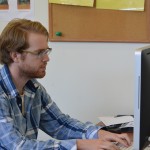Soriano and Rivera Hernández Talk Hispanic Heritage Month
With Hispanic Heritage month quickly approaching, the Falvey Memorial Library had the chance to sit down and talk with Dr. Raúl Diego Rivera Hernández, assistant professor of contemporary Mexican literature and Latin American studies, and Dr. Cristina Soriano, an assistant professor in the history department and director of the Latin American Studies Program.
We discussed the reasons for celebrating Hispanic Heritage Month, their reasons for bringing these festivities to Villanova, and the elements of their own personal careers and research.
The celebration of Hispanic Heritage running from mid-September until October may appear arbitrary to the casual observer. Hernández offers clarification, however, “the idea is to start with activities on September 15 because this is the time when at least five Latin American countries start celebrating independence.”
(Villanova University Latin American Studies Banner)
Also, according to Hernández, the festivities typically end on or around “October 12 connected with the arrival of the Spaniards in the Americas in 1492.”
The festivities here at Villanova will last well beyond that Oct. 12 arrival; the Latin American Studies Program and the Romance Languages Department have scheduled events up until Nov. 17.
The added time here at Villanova will help Hispanic Heritage Month accomplish its tripartite mission: to celebrate, to inform, and to raise awareness. Dr. Soriano encourages Latina/Latino and Latin American students to participate, stating, “this is a place for them to celebrate Latin American culture.”
The events are not limited to students of Hispanic descent. Dr. Soriano wants the rest of the population here at Villanova to know, “we’re inviting students who are not Latino or Latin American to get to know Hispanic culture better.”
Just chatting with these two extremely knowledgeable professors cultivated an interest in Hispanic Heritage for me. According to Dr. Hernández, this interest is a main goal of the events. One important part of the celebration, according to Hernández, is to “attract more students from Spanish who are thinking about a major to see what we do as professors and as researchers.”
He also wants to “attract people who are Spanish-speaking students but also people who are interested in different countries from Latin America, people who want a perspective on Latin American history or a perspective on Latin American culture.”
While celebration and information are important to Hernández and Soriano, raising awareness about current issues in Mexico and the rest of Latin America remains paramount to their mission. Soriano mentioned, “Something I always teach my students: universities are places where students are always connected with political realities.”
This is true for her in both the United States and Latin America, but she stressed, “Students are always a vibrant part of politics in all countries of Latin America. It’s important for Villanova University students to know that this is how Latin American politics develop.”
Hernández continued, “we’re speaking here of alternative politics. The participation of students is not always connected to political parties or state institutions. Political participation in this country is usually linked to electoral competition and lining for Democrats or Republicans; in Latin America it is completely different.”
Hernández’s own interest is in contemporary public sphere movements in Latin America. He is particularly interested in promoting awareness about the 43 students of Ayotzinapa who disappeared in Iguala, Guerrero, Mexico on the night of September 26-27, 2014. Tragic events such as these trigger varying responses and different types of activism in Latin America and Mexico.
Hernández edited a book that explores the connections between online and street activism in the case of #YoSoy132, a student movement that emerged in Mexico in the context of the presidential campaign of 2012, titled “Del Internet a las calles: #YoSoy132, una opción alternativa de hacer política” (From the Internet to the Streets: An Alternate way of Doing Politics), which was published by Editorial A Contracorriente (North Carolina State University) earlier this year.
(Scholarship from Villanova’s own Romance Languages Department)
“I do the same thing, but in the 18th century using pamphlets and manuscripts,” Soriano added.
Soriano graduated with an anthropology degree in Venezuela. “Then I was accepted into Ph.D. programs in the Unites States and attended NYU,” she continued, “my question has always been: ‘if Venezuela was introduced to the printing press so late, how did people get their information?’”
Perhaps you can find the answer to that question in her up-coming book from New Mexico University Press entitled Tides of Revolution: Information and Politics in Colonial Venezuela.
For any other questions you might have about Latin America culture, or if you just want to come and celebrate your Hispanic Heritage, check out the upcoming events, available here.
 Article by William Repetto, a graduate assistant on the Communications and Marketing Team at the Falvey Memorial Library. He is currently pursuing an MA in English at Villanova University.
Article by William Repetto, a graduate assistant on the Communications and Marketing Team at the Falvey Memorial Library. He is currently pursuing an MA in English at Villanova University.
0 Comments »
No comments yet.
RSS feed for comments on this post. TrackBack URI

